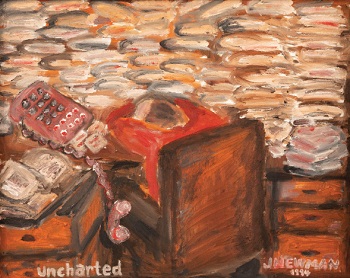Uncharted
The despair of administrative backlog has changed but not disappeared.
The year was 1994 and I was working in a traditional internal medicine practice, both inpatient and ambulatory, in Galveston, Texas. There might be a handful of hospital patients during the week, perhaps one or two in the small ICU of St. Mary's. The weekends were busier. The more complex patients would often transfer across the street to the University of Texas Medical Branch's John Sealy Hospital. I guess I was the guy who always seemed to transfer patients on a Friday afternoon. Clinic was busy and it was often hard to balance the needs of my outpatients with those that were hospitalized. We had our own little lab and X-ray machine, and we managed to easily cover our overhead.

In general, it was a wonderful and rewarding practice. I loved taking care of my little old people, making house call rounds with a gaggle of medical students in my old Cadillac convertible, Bluebonnet. Life on the beach was fine.
But not always. Administrative tasks would stack up, the hospital practice would get busy, my schedule would fill with the patients who were most difficult, due to their personalities, their diagnoses, or worst of all both at once. The paperwork would geometrically expand. Sometimes, the forces of the universe combined to cast a malignant and chaotic shadow.
I remember the dispiriting impact of a desk piled high with an ominous stack of undocumented charts. In the foothills of this mountain of work were a variety of sticky notes with patient phone calls, disability and home health forms, abnormal lab reports, and prescription refill requests. Usually I would have all my charts completed every day before I left. It was best that way.
These were the days before electronic medical records, and the empty charts were a physical reminder of my deficits. I would open a chart and try to remember why I had seen the patient. There would be some vitals, test results, and a few lines of my illegible chicken scratch to guide my thoughts. The longer I waited, the more difficult it would get. There was no time to concentrate, the patients kept coming, and all the phones were blinking red lights. I would put my head on the desk and try to gather my strength to fight a battle with the gods of documentation. We were a private practice with a thin margin. I needed those professional charges to keep the doors open.
It was on a day such as this, when everything went wrong, from patient care to lost billing sheets, that I was a straw away from a broken camel's back and came home filled with unmitigated despair. I had to channel that negative energy somehow, so I got out my paints, choosing a depressing palette to match my emotional landscape. I painted “Uncharted” and slept well that night. By the weekend my desk was cleared.
Things are now different, but still the same, in the era of electronic medical records. Much is automatically captured and it's harder to misplace details, but there's ICD-10, HCCs, and other alphabetic tortures waiting for the unwary. The physical stigmata of administrative burden—charts piled high on your desk, floor, and chairs—are now neatly hidden behind the screen of the monitor. A hundred incomplete records, 50 refills, 30 insurance forms, 25 documentation queries, 10 peer-to-peer requests, and 1,200 unread emails exist in a incorporeal netherworld. Physicians struggle to battle this administrative onslaught, and though there is no impending physical record avalanche, the burden is still palpable. One fact has not changed: The farther behind you get, the more insurmountable the tasks, and the deeper the trough of despair.
So next time you find yourself buried in virtual records, or up to your neck in query quicksand, go home and get your paintbrush or your journal. Or go to the gym or play with your kids. If you can, leave your work at work and do something to redirect the negativity. Sleep well. Tomorrow you can tackle that Sisyphean tower of electronic agony. And be glad you have more to go on than a half-page of chicken scratch.



